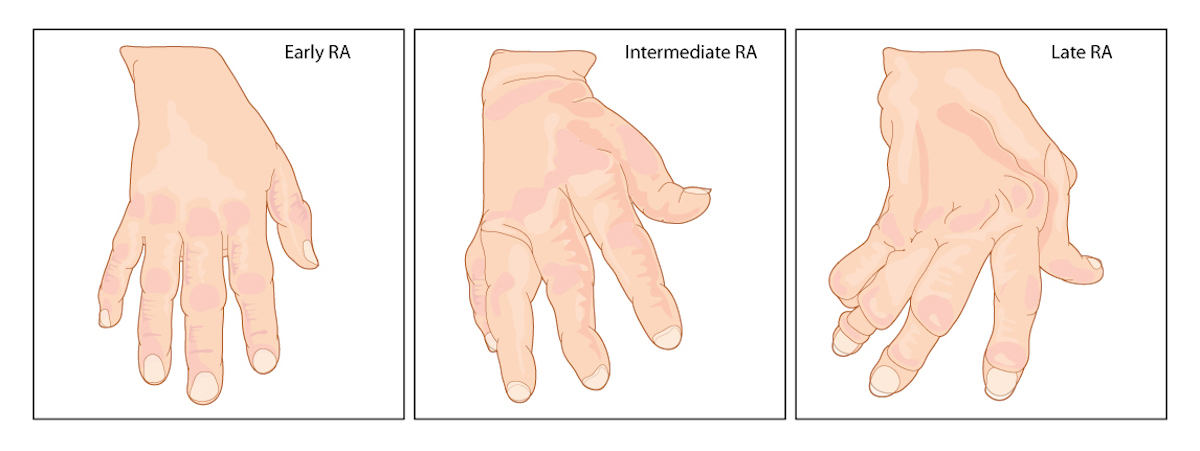Most people are familiar with the term arthritis, but did you know that this is an umbrella term for various joint disorders? Arthritis includes more than 100 conditions that affect the joints in our bodies. All types have different causes, risk factors, symptoms, and treatment options. One of the best-known types is rheumatoid arthritis. About 1.5 million Americans have rheumatoid arthritis, and every year about 200,000 people get diagnosed with this joint disorder. Everyone should know its symptoms, risk factors, and possible treatment options. The sooner someone gets diagnosed, the better!

Cause of Rheumatoid Arthritis
Before we tell you what causes rheumatoid arthritis and whether you are at risk of getting it, it is even more important to know exactly what this condition entails. Rheumatoid arthritis – also known as RA – is a chronic inflammatory disorder that affects the lining of your joints but can also damage other parts of your body. Think of your skin, eyes, blood vessels, and vital organs. Despite being called a joint disease (arthritis), it is an autoimmune disease. This means that the immune system inadvertently attacks (healthy) tissues in the body. Rheumatoid arthritis attacks the lining of joints, which causes painful swelling, and ultimately even bone erosion & joint deformity. Unfortunately, medical experts still don’t know what triggers this process.
Risk Factors of RA
Several factors increase the likelihood of getting RA. For example, women are 2-3 times more likely than men to have this autoimmune disease, and age also plays a role. You can develop rheumatoid arthritis at any age, but often it does not develop until middle age. Other risk factors are:
- Family history
- Smoking
- Overweight / Obesity
If someone in the family already had RA, it immediately increases your risk of getting it yourself. This is called genetic predisposition. We cannot say this is enough: Smoking Kills You! Most people already know it increases the risk of getting certain types of cancer, but it also increases the risk of getting rheumatoid arthritis. Being overweight also increases the risk of various diseases, including this one.
Although rheumatoid arthritis is called an autoimmune disease, it mostly affects the lining of your smaller joints. In the disease’s early stages, it affects the joints connecting the fingers to the hand and the toes to the foot. The more arthritis progresses, the more joints are affected – for example, the wrist, knees, ankles, and elbows.

Symptoms of Rheumatoid Arthritis
When a joint is affected, it will feel tender, warm, and swollen. In addition, joints will feel very stiff after waking up or after long periods of inactivity. These symptoms often result in feeling severely tired, having a fever, or losing your appetite. To make it worse, 40% of rheumatoid patients also experience that the disease affects areas that don’t involve the joint. Examples are the skin, eyes, vital lungs, and bone marrow.
Complications of RA
Having RA means you’re at risk of developing more diseases – especially if it’s left untreated. Possible complications are:
- Osteoporosis
- Rheumatoid nodules
- Carpal tunnel syndrome
- Heart problems
- Lung disease
- Lymphoma
Treatment Options for Rheumatoid Arthritis
To avoid or delay these complications and treat the symptoms, it’s extremely important to contact your professional healthcare provider and get a diagnosis. Possible treatment options for rheumatoid arthritis are:
- Prescribed medication to slow the disease and prevent joint deformity – called DMARDs
- Biological treatments; an injection to stop the immune system from attacking the body
- Painkillers to treat the symptoms – prescribed or over-the-counter
- Steroids to reduce pain, stiffness, and swelling
- Physiotherapy to improve your muscle strength and flexibility of the joints
The right treatment plan depends on your overall health, and how severe your symptoms are. As you already know, there isn’t a cure for rheumatoid arthritis, but it’s crucial to diagnose it in its early stages and help prevent further joint involvement and damage. If left untreated, RA can be disabling, causing terrible chronic pain. Finding a treatment that treats your symptoms is important, so make sure you’re well-informed. To help you on your way, start your search here:

